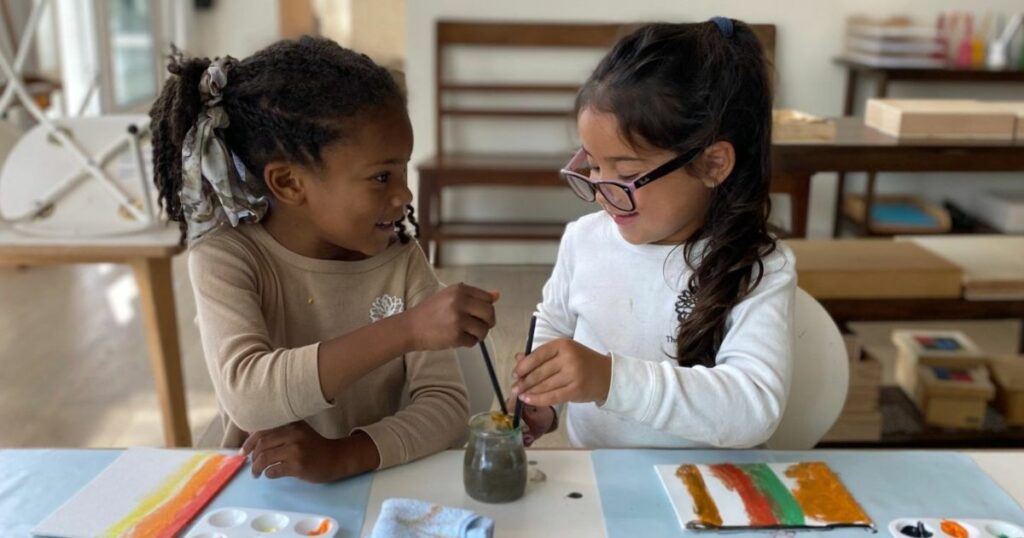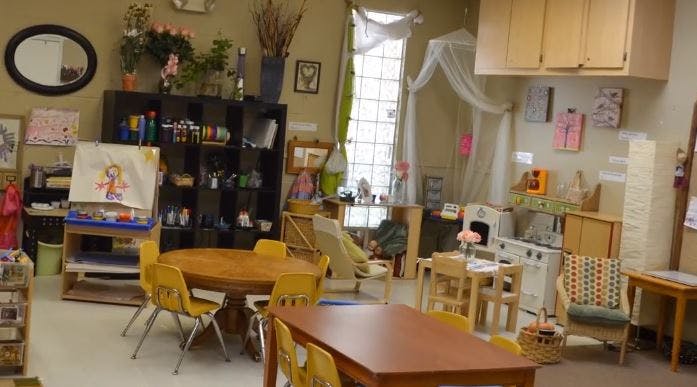What are the Qualities of a Montessori Teacher?
#8 Serve as a link between the kids and the resources.
If you don’t know how to do something, neither will the kids. Even if you’ve completed the training, you may find that you’ve lost touch with specific skills that aren’t used frequently. Prepare yourself by studying and reviewing, and be ready to jump in and present work whenever it becomes required (or re-present it, as need be).
What more can you do to help children connect with their surroundings? Demonstrate how to clean and maintain the classroom. Nothing in the classroom should be off-limits to them. When they inquire about a substance, be prepared to demonstrate how to use it. Rearrange the materials as needed to be easier for them to access.
#7 Pays Close Attention
A Montessori teacher uses approaches; very different from what you may have experienced as a parent in a traditional school. In a Montessori classroom; there are no rows of chairs facing a chalkboard. A Montessori instructor rarely stands up and gives extensive talks.

Indeed, the Montessori philosophy establishes academic milestones for a child’s progress, but the teaching is done from a more organic bottom-up philosophy, with individualized instruction guided by children themselves, rather than from a top-down approach with multiple quizzes, tests, and note-taking lessons. The Montessori teaching method is based on the idea that children should be allowed to study at their own pace.
Good observers can direct students in the right direction with the necessary resources. They can also recognize when a child is ready to master a skill and progress to the next level.
The ability to observe and guide rather than punish and take over is a fundamental difference between a Montessori classroom and a normal preschool.
#6 Establishes a Connection
Even the toys at a Montessori classroom are unique.
These toys may look to the untrained eye and a youngster to be simple playthings, yet each one has been meticulously crafted, vibrant, and eye-catching.
Older students can benefit from beautiful golden beads strung on wires to help them learn the decimal system. Colorful cubes and prisms are used to teach visual shape and color identification. While using a button frame, a child can focus on minor motor skills.
In addition, the youngster can immediately see if the buttons are positioned incorrectly, helping him to gain independence by resolving the problem himself.
Educators are taught throughout Montessori teacher training that their primary responsibility is to serve as a link between the children and their learning resources. Teachers give lectures to the students, which piques their interest and motivates them to participate. When looking for a Montessori school, parents should look for teachers who can effectively connect with children and whose classroom resources are open to them.
#5 Recognizes the value of specialized training
Montessori educators must have at least a bachelor’s degree and possess distinctive attributes to pursue Montessori training. The requirements for becoming a teacher differ by state and may differ depending on the age group being taught. A bachelor’s degree is required for admission to an approved Montessori teaching program, which can be completed in one year or two summers. A year-long teaching internship is required before a teacher can be considered for a position at a Montessori school.
#4 Promotes initiative, self-reliance, and independence
Montessori education instills self-confidence in children at a young age by preparing teachers to serve as mentors on each child’s academic journey. A Montessori teacher knows when to intervene and demonstrate, and when to step back and let the child learn from their own mistakes.
A child who learns how to zip, fasten buttons, and tie a knot by trial and error and careful supervision will soon be dressing himself, proud of his accomplishments. This emphasis on trial-and-error learning and embracing mistakes as they happen has repercussions. Pride in one’s successes is a source of confidence. Confidence is the source of boldness and independence. Independence is followed by self-reliance. These characteristics are difficult to “teach” through any other means than trial and error with one’s own hands. They are character attributes that will assist children regardless of what they choose to do with their lives.
#3 Promotes Creativity
When a child is enthusiastic about something, nagging, prodding, or pressuring them to learn more is pointless. Creativity is the driving force behind innovation. Based on close observation and regular record-keeping, Montessori teachers keep specialized and tailored teaching plans and goals for each child in the classroom. These techniques aid the children in achieving new academic, social, and developmental objectives. A Montessori teacher does not pressure a child to achieve such goals. Instead, they use the learner’s innate curiosity and infinite creativity to propel them far beyond those milestones.
#2 Always sets a good example.
Children are compelled to copy what they see and hear. It’s all part of the learning process. Montessori teachers set an example for their children. They allow them to understand how things work. These teachers act as consistent role models for their students, demonstrating appropriate behavior, communication, and orderliness.

A Montessori teacher becomes a role model first and foremost by treating all children with true respect. The intense curiosity of a kid is recognized as a superpower by a Montessori teacher. A teacher can most successfully direct such curiosity along fruitful paths by using sympathetic listening and sharp observation to intentionally harness that potential.
#1 Makes Mistakes and Learns from Them
Montessori teachers urge children to be inspired by mistakes rather than disheartened by them and to correct them on their own with the support of gentle guidance from the teachers. It is vital teaching children that mistakes are unavoidable and can be used as learning opportunities. Montessori-trained teachers do what they preach. Making mistakes and learning from them can help teachers improve their students’ classroom experience.
Takeaway:
Montessori education is wonderful, and Montessori teachers are exceptional people, as we can see from reading this blog. Today, many parents opt for Montessori education for their kids. You can also think of this option. So, why worry? Search for the best Montessori school now!






